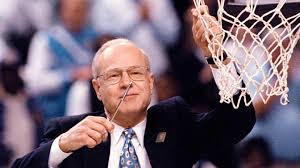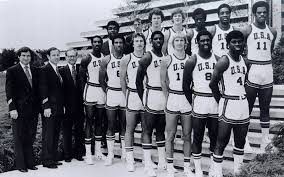The NBA Finals date back to 1947 (when they were known as the Basketball Association of America Finals) and the very 1st NCAA tourney was held in 1939. Olympic basketball competition is even older: it debuted as a demonstration event in 1904 and the men’s version became a medal sport in 1936, with the women finally getting their chance to go for the gold in 1976. The United States has dominated Olympic basketball competition from the start: the men have won 15 gold medals in the 18 tournaments they have participated in during the past 84 years, while the women have won 8 gold medals in the 10 tournaments in which they have competed during the past 44 years. Those of you who were looking forward to the 2020 Olympics opening ceremonies in Tokyo on July 24, 2020 will have to wait an extra 364 days, as the coronavirus caused a postponement until July 23, 2021. Due to the absence of college basketball since mid-March, HoopsHD’s Jon Teitel decided to fill the void by trying to interview as many prior Olympic players/coaches as possible so that you have something to read this summer while not watching the Summer Games. We continue our coverage by chatting with Leesie Guthridge about her late husband Bill winning a gold medal in 1976 and making 14 Final 4s. Today marks the 44th anniversary of team USA beating Yugoslavia 95-74 to clinch the gold medal AND it would have been his 83rd birthday so we are proud to honor his memory.
Bill made the 1958 Final 4 as a player at Kansas State for Hall of Fame coach Tex Winter and the 1964 Final 4 as an assistant to Tex: what made Winter such a great coach, and what was the most important thing that Bill ever learned from him? Bill thought that Tex was a great coach but I hardly knew him. He developed an offense called the Triangle which was used by his college team and later the NBA championship teams of the Bulls/Lakers.
He graduated with a degree in mathematics and later got a masters’ degree in education: how much importance did he place on academics? He felt that academics were VERY important. His mother/father had both been teachers and his father later became Superintendent of Schools in Parsons, KS. He was unhappy when players began leaving school early and would hate the situation today when players only stay 1-2 years before going to the pros without getting a college education.
He spent 30 years as an assistant to Hall of Fame coach Dean Smith at North Carolina: why did he stick around for so long rather than try to become a head coach elsewhere, and what kind of relationship did the fellow Kansas natives have after working side-by-side for 3 decades? Bill & Dean were both from Kansas and had known each other for many years before Bill came to Chapel Hill. They had very similar backgrounds: Dean’s parents were also teachers in Kansas. They made a good team: Bill did things that Dean did not like doing while Dean did some head coaching things that Bill did not like doing. Even though they had different personalities they thought alike on many issues. Bill had many opportunities to become a head coach but turned them down after exploring them. His goal was never to be a head coach. He seriously considered offers from Penn State/Arkansas/Georgia Tech but in the end he decided that he already had the best job possible at UNC.
He had many roles in Chapel Hill including recruiting, coaching pivot play to the big men, serving as shooting coach, and overseeing summer basketball camps: did he have a favorite role, and how was he able to take on so many different things? Bill was very organized and was able to accomplish a lot. He liked all of his roles in coaching.
He served as an assistant to Smith for team USA at the 1976 Olympics: how much pressure was there on the team to win it all after the USA’s controversial loss to the Soviets in the 1972 gold medal game? I do not know about the pressure to win that game: he mainly talked about the total experience. He really liked Montreal and enjoyed having John Thompson as 1 of his fellow assistant coaches.
What did it mean to him to represent his country, and what did it mean to him to win a gold medal? Bill loved participating in the Olympics: he was very patriotic and felt that it was an honor to represent his country. UNC always played to win games, tournaments, and of course the Olympic gold medal.
After Smith retired in October of 1997 Bill took over, led his team to the Final 4, set a record for 1st-year coaches by winning 34 games, and was named national COY: how did he feel about replacing his former boss, and what did it mean to him to receive such an outstanding honor? They had many discussions about retirement but Bill was already 60 so knew that he would not coach many more years. When Dean retired their team was gone. Bill took on Dean’s former duties but there was not really anyone to take on Bill’s former duties so he did both jobs: it was very exhausting for him!
He finished his career with 14 Final Fours on his resume (1 as a Kansas State player, 1 as a Kansas State assistant, 10 as a North Carolina assistant, and 2 as a North Carolina head coach), which remains the most in NCAA men’s history: do you think that anyone will ever break his record, and did it reach a point where the family just stopped making plans every spring because they assumed that they would be attending the Final 4?! Records are always broken at some point so his will probably be broken. He felt very honored to receive the Coach of the Year Award. March/April were never vacation months for our family: we always had kids in school and whenever Bill finished a tournament it was still a recruiting month for him.
In 1994 he was inducted into the Kansas Basketball Hall of Fame and in 2013 he was inducted into the North Carolina Sports Hall of Fame: where did these rank among the highlights of his career? Bill felt very honored by the Hall of Fame Awards but I would say that they were not the highlights of his career. Tournament wins, Final Fours, National Championships, and Olympic gold medals were more important to him.
He passed away in 2015: when people look back on his career, how do you think that he should be remembered the most? I think that Bill would like to be remembered as a good/honorable person. He was a good coach who always wanted the best for his players: to become good people 1st and good players 2nd. I have had many people tell me how much they miss him and his manner on the court.


